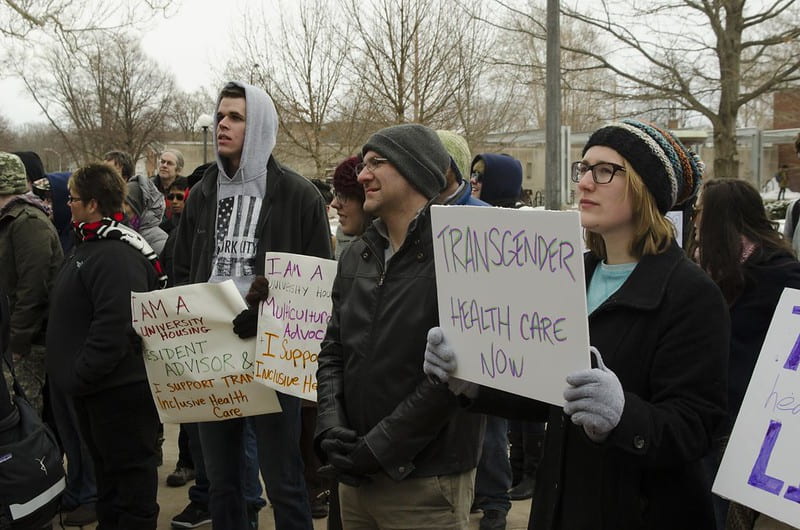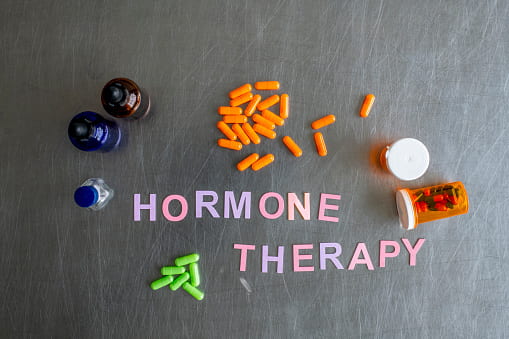After decades of systemic and societal discrimination, an array of hope burst through the clouds of despair for transgender individuals. Recently, greater acceptance of transgender individuals in modern culture has opened doors to accessible and evidence-based transgender healthcare. Budding healthcare infrastructure has helped transgender individuals transition and care for their changing bodies providing relief for the marginalized community. Healthcare professionals and teams of scientists worked for decades through societal judgement and the subsequent roadblocks to ensure that the transgender community had an improved chance at a healthy life as non-transgender individuals. However, increasing vitriol exacerbated by politicians has tightened restrictions for gender affirming healthcare across the United States.

Introduction
In February 2022, Texas Governor Greg Abbott and Attorney General Ken Paxton released a directive stating that gender transition therapies including hormone therapies, puberty blockers, or surgery given to minors can be investigated as child abuse and given criminal penalties. Officials, teachers, parents, nurses, and anyone involved in direct contact with children were required to report suspicions of such therapies, framing the act more as concern for children’s safety and innocence. Anyone found supporting or prescribing such treatment, including parents or healthcare providers, would be subject to child abuse investigations by the Texas Department of Family and Protective Services. The agency was instructed to prioritize cases in which parents who provide their transgender children with gender-affirming care above all other child abuse cases. Strangely, the caseworkers were told to investigate regardless of whether the standard of sufficient evidence was met and to not record their investigation in writing.
Days after the directive was announced, the Texas Department of Protective and Family Services launched an investigation into a federal employee, a mother of a transgender daughter, after she inquired when the directive would be made effective. A federal judge blocked the investigation only 2 days later. In the immediate weeks following the directive‘s release, at least nine families were already facing child abuse investigations for supporting their transgender children in obtaining gender-affirming care. This past spring, the clouds in an otherwise tranquil sky began to blot out blossoming hope as intimidated healthcare providers canceled hormone prescriptions and the few existing transgender youth treatment facilities closed. Families clamored to find alternative sources of hormones and puberty blockers for their children. Some became afraid to claim the transgender label, many moved out of the state, and hundreds more were at home, fighting for their right to exist as their gender identity and as themselves.

Medical Evidence
In a statement to the Texas Tribune, U.S. Surgeon General stated that this directive interferes with the physician-patient relationship which has no place for religion, beliefs, or politics. Abbott’s directive and Paxton’s following opinion sparked intense backlash from the medical community for blatantly ignoring decades worth of research supporting early transitional care.
When children first learn that they are transgender, they face a physical and mental health disorder known as gender dysphoria. Gender dysphoria is a condition where individuals experience severe dissonance between the gender they identify as and the physical manifestations of their biological gender. Depression, anxiety, and suicidal thoughts often follow this sense of “not self” that plagues many adolescents as they begin to come out to the world with their new name and pronouns. To significantly improve the outcomes of transgender individuals, all major medical organizations including the American Academy of Pediatrics, American College of Physicians, and American Psychiatric Association support gender transition as an effective therapy. Transitioning includes gender-affirming hormonal therapy and puberty blockers. Hormonal therapy begins and allows for a smoother transition into the opposite gender while puberty blockers suppress the body’s natural maturation process to increase the amount of time children and their bodies have to transition into a new gender. In the meantime, individuals receive mental health support and preparation for a successful transition and in unfortunate cases, wait for legislation to increase access to gender affirming treatments.

The most prevalent medical reason for opposing gender transition is the possibility that a transgender individual will have regrets, because what is done cannot be undone easily. Although it is a valid concern, puberty blockers exist for children and individuals who are uncertain about their gender, because they provide ample time for the individual to choose not to change genders, if that is later realized. In addition, regrets are “extremely rare” and can be attributed to adverse social climates more than personal attitude. Proper mental health support and preparation are also important for a successful gender transition to recognize behavioral changes and tackle the paradoxical shared sentiment that transgender people are no longer welcome in conservative society.
Alabama and Florida Response
Governor Abbott’s attempt to restore conservative values in Texas is not a new phenomenon. Texas has seen several bills criminalizing medical care for transgender children which is reflective of a broader trend across the United States. In the past year alone, 21 states drafted bills to deny transgender medical care. Arkansas passed a bill making it illegal to prescribe puberty blockers and for insurance companies to cover transgender care. Other conservative states, such as Alabama, have taken Abbott’s directive as a green light and are preparing legislation to discourage transgender healthcare and marginalize the LGBTQ+ within their borders. Taking a slightly different approach, Governor DeSantis of Florida introduced what is commonly referred to as the “Don’t Say Gay” Bill (House Bill 1557). Also known as the Florida Parental Rights in Education Act, the bill was signed into law and passed by the Florida Senate in March 2022. This bill would effectively prevent gender identity and sexual orientation education in classroom discussion in Florida. Experts worry that the vague descriptions in the law indicate that it be used it to suppress all actions that remotely fall under the literal definition of sex and gender, leading to a dangerous slippery slope that may open a dark path of minority discrimination.

On April 8th 2022, Alabama Governor Kay Ivey signed into law two bills preventing medical professionals from providing gender-affirming care and forcing individuals to use the restroom of their biological gender. In an unprecedented move, the Vulnerable Child Compassion and Protection Act makes arranging gender-affirming treatment including puberty blockers, cross-sex hormones, and surgery for children under 19 a felony with a possible sentence of up to 10 years in prison if convicted. The second bill is culturally similar to Florida’s “Don’t Say Gay” Bill. This bill prohibits teaching or using words related to “sex” and “gender.”
Current Status
A lawsuit filed by families of transgender children weeks after Abbot’s directive was announced resulted in an injunction from federal courts. Abbott vs Doe reached the Supreme Court in May 2022 during which the court ruled that Abbott had no authority to control child welfare officers and direct them to investigate providing transgender healthcare. The country released a sigh of relief, but the fight is not over. Stopping Abbot’s directive seems more akin to a pause on the right’s crusade against the transgender community than a stop.
Recent reports from The Washington Post also suggest that Attorney General Paxton attempted to collect gender marker changes and other transgender identifying information on driver’s licenses from the Texas Department of Public Safety in early 2022. Human Rights Campaign reports that Paxton’s office requested the names and license plates of these individuals later in the inquiry, as well. This news comes as a new shackle for transgender Texans. Some have changed back their gender identity on their licenses to the way it was prior. If not, police or other government officials would know of their transgender identity with the search of their name during traffic stops or unrelated incidents which could lead to dangerous discrimination.
To support the fight for transgender safety in Texas, support politicians and lawmakers who oppose legislation limiting transgender healthcare. Advocate for the reopening of the University of Texas’s youth transgender clinic, the only one of its kind in the southwestern United States, that closed last November. People in Texas and across borders can also donate Lambda Legal and the American Civil Liberties Union (ACLU) which are organizations working to keep the injunction in place on Governor Abbott’s directive after AG Paxton filed an appeal against the federal court decision. They, in conjunction with the Transgender Education Network of Texas and Equality Texas have also assembled the LGBTQIA+ Student Rights Toolkit which is a set of explanations and guidelines to understand Texas’s current plight as well as additional resources such as TX Trans Kids.
